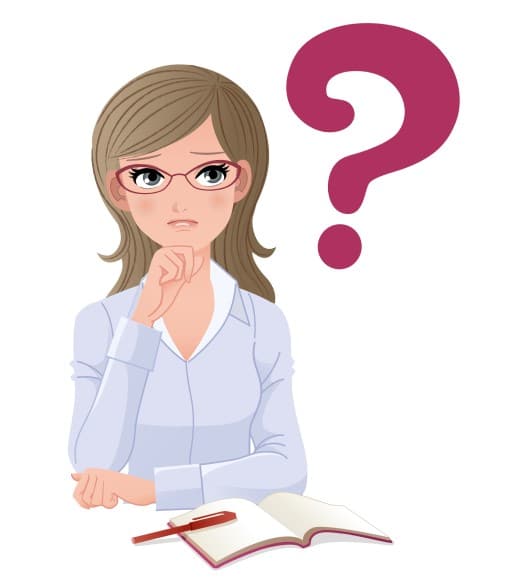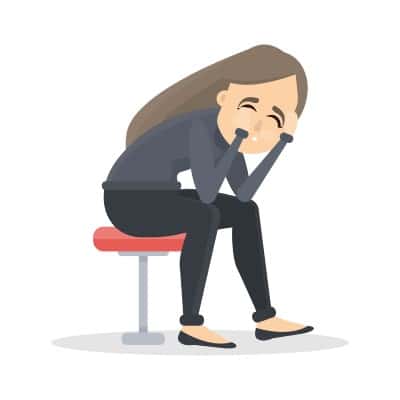
Does sleep apnea get worse over time? – What we know and how to keep it from happening
By Jason Wooden, PhD | February 7, 2020
Wondering whether sleep apnea can get worse with time and if you need to do something different? Recent research suggest that obstructive sleep apnea symptoms can worsen as you get older.
There’s a lot you can do to keep things from getting worse – maintain a healthy weight, avoid smoking and alcohol, and stay physically activity. You should also make sure you have the right treatment to help keep your sleep apnea under control.

It’s high stakes whether your sleep apnea will get worse over time
Living with sleep apnea can be pretty frustrating.
Sleep apnea snoring can also make for miserable nights for a bedmate.
So, it’s understandable if you’re curious whether your sleep apnea will get worse over time.
Maybe your symptoms are mild and you’re wondering whether you need to do anything at all.
Or perhaps, your sleep apnea was under control and lately things just seem to be getting worse.
Regardless of the reason, it’s a good question to ask, because the stakes are high. We know what sleep apnea can do to ruin someone’s life.
It’s a sleep disorder in which breathing is repeatedly interrupted during sleep. The breathing interruptions cause you to fall out of restorative deep sleep into a lighter sleep which is why you wake up feeling like you didn’t sleep at all.
And when this happens night after night, it can take a huge toll on you, your sleep, and your relationships.
Sleep patterns are known to change as part of the normal aging process. As you get older, you spend less time in deep sleep.
Older people generally have a harder time falling asleep and staying asleep. And according to a National Sleep Foundation poll, 44% experience insomnia symptoms at least a few nights each week.
But what you’re really wondering is what happens with sleep apnea as time goes by.
Can it really get worse as you get older or if left untreated?
Should you stay the course or try doing something different?
Let’s take a look at what the research says and what you can do about it.

What does the research say about sleep apnea getting worse over time?
We’re going to focus on obstructive sleep apnea since it’s the most common type of sleep apnea. It’s also the sleep apnea type that’s been the most researched.
Obstructive sleep apnea, also known as OSA, occurs when muscles in the throat relax too much during sleep and block the airway. This interrupts your breathing and arouses you out of deep restful sleep into a lighter sleep.
Worldwide it’s estimated that almost a billion people have sleep apnea. In the US, over 18 million adults live with sleep apnea and it generally is seen more in older age groups.
Wow, that’s a lot of people and many of them are probably wondering does sleep apnea get worse with time.
In 2014, researchers did a study which involved 1,975 male and 378 female OSA patients.
They looked for links between sleep apnea severity and a variety of other factors. What they found is that age was associated with worse symptoms for males over 40 and females 45 – 53 years old.
A more recent studied confirmed that age is an important risk factor for more severe sleep apnea symptoms.
In 2017, researchers analyzed the sleep study data of over 1000 patients. (A sleep study is an overnight test where your sleep patterns, awakenings, and other sleep apnea symptoms are recorded.)
They looked at the effect of age on severity of OSA and found that sleep apnea symptoms do worsen with time. Overall, OSA patients had more nightly sleep apnea events and the breathing interruptions lasted longer as they got older.
What this all says is that sleep apnea can get worse over time.

Okay, why would my sleep apnea get worse over time?
Okay, why would my sleep apnea get worse over time?
Right now, you’re probably wondering what causes obstructive sleep apnea to worsen as you get older.
First off, aging does affect the brain’s ability to keep throat muscles stiff still during sleep. Also, older people are also believed to have more sleep apnea because of the increased fat in the neck area which changes the areas around the pharynx.
And women are more likely to develop sleep apnea after menopause.
There are other risk factors for sleep apnea that come into play as you get older:
1) Weight
This is by far the biggest risk factor for sleep apnea. If you’re overweight, you’re likely to have extra tissue in the throat which can fall down and block the airway.
Did you know that 70% of adult OSA patients are obese? Patients with mild OSA who gain just 10% of their body weight are at a six-fold risk for their sleep apnea getting worse.
So, if you’ve lately been putting on the pounds its no surprise if your sleep apnea is more noticeable.
2) Other medical problems
As you get older, you encounter more medical problems which can lead to more sleep problems. Conditions like diabetes and high blood pressure are directly associated with higher rates of sleep apnea.
So, if you’re dealing with health issues you didn’t have before, that’s another reason your sleep apnea could get worse with time.
3) Medications
Have you started taking a new prescription lately? Many medications can aggravate snoring and sleep apnea.
Those pills you’re taking for pain, anxiety, or insomnia can cause the throat to be even more relaxed and obstructed.
4) Alcohol
Are you drinking more than you used to? Alcohol consumption is associated with a higher risk of sleep apnea.
Experts believe it can make affect your breathing patterns and relax the throat. Some studies have shown that moderate to heavy drinking can cause sleep apnea symptoms in people who don’t even have the condition.
5) Smoking
Cigarette smoke can irritate and inflame the airway, causing swelling which makes it harder for air to flow. Recent research suggest that active smokers may develop OSA earlier and OSA in current smokers may be more severe.

Your sleep apnea doesn’t have to get worse over time
So far, we’ve talked about what the research says and the things that can worsen obstructive sleep apnea as time goes by.
However, the truth is that things don’t have to get worse since we know so much about the age-related risk factors.
There’s lots you can do to keep your sleep apnea from worsening and wrecking your sleep:
Weight loss:
Since obesity is such an important risk factor for sleep apnea, it should be no surprise that shedding pounds can help improve symptoms. Experts say that losing 10% of your weight can lead to a 20% improvement in OSA severity.
Learn more:
How weight loss can improve sleep apnea
Healthy weight loss tips
Avoid smoking and alcohol:
Since alcohol and smoking can irritate the airway and aggravate sleep apnea symptoms, it’s obvious if you can cut back on your consumptions it can help improve your sleep. Experts say that even avoiding them in evening can help.
Get more physically active:
Regular physical activity is known to promote deep restful sleep. It can also help you get down to a healthier weight.
Get treated:
Make sure you’re doing everything you can to keep your sleep apnea under control.
If you haven’t been properly diagnosed, schedule an appointment with your doctor today. You’re not alone. 80 percent of the cases of moderate and severe obstructive sleep apnea are undiagnosed.
If your current treatment isn’t working, they’re now plenty of options to try – more comfortable CPAP air pressure systems, body positioners, nerve stimulators, and surgical implants.
If you don’t have insurance to see a doctor and get treated, you still have options to get help at minimal or no cost.
Learn more:
Sleep disorder diagnosis
Alternative sleep apnea devices to try if CPAP doesn’t work for you
How to get diagnosed and treated without insurance
What to remember about sleep apnea getting worse over time:
- Research shows it can get worse as you get older
- There’s plenty you can do to keep it under control
- Make sure you have a treatment that works for you
You may also be interested in:
Sources:
1. “Sleep Apnea”, National Sleep Foundation website
2. “Aging changes in sleep”, Medline website
3. “Aging and Sleep”, National Sleep Foundation website
4. “More Than 936 Million Have Obstructive Sleep Apnea Worldwide”, 2019, Sleep Review website
5. Obstructive sleep apnea is a common disorder in the population—a review on the epidemiology of sleep apnea, J Thorac Dis. 2015 Aug; 7(8): 1311–1322.
6. Age-Group-Specific Associations between the Severity of Obstructive Sleep Apnea and Relevant Risk Factors in Male and Female Patients, PLoS One. 2014; 9(9): e107380.
7. Severity of individual obstruction events increases with age in patients with obstructive sleep apnea, Sleep Med. 2017 Sep;37:32-37.
8. “Causes of Obstructive Sleep Apnea”, WebMD
9. “Age and Sleep Apnea: Does Age Affect The Prevalence of Sleep Apnea?”, 2019, Alaskasleep.com
10. “Weight loss, breathing devices still best for treating obstructive sleep apnea”, 2013, Harvard Health website
11. Impact of concomitant medications on obstructive sleep apnoea, Br J Clin Pharmacol. 2017 Apr; 83(4): 688–708.
12. Alcohol and the risk of sleep apnoea: a systematic review and meta-analysis, Sleep Med. 2018 Feb; 42: 38–46.
13. “How Alcohol Affects Sleep Apnea and Snoring by Relaxing Airway Muscles”, 2019, Verywellhealth.com
14. Where there is smoke…there is sleep apnea: exploring the relationship between smoking and sleep apnea, Chest. 2014 Dec;146(6):1673-1680.
15. The impact of smoking status on obstructive sleep apnea (OSA) severity., European Respiratory Journal 2018 52: PA4356.
16. “Obesity and Obstructive Sleep Apnea”, Obesity Medicine Association website
17. “Hidden Health Crisis Costing American Billions: Underdiagnosing and Undertreating Obstructive Sleep Apnea Draining Healthcare System”, 2016, American Academy of Sleep Medicine report
Connect with us:
About Us
Better Sleep Simplified® was founded as a place for you to get clear and well-researched information.
Our goal is to make sure you know about your options so that you take action sooner rather than later.
Check us out on YouTube:
Watch and Learn
Helpful sleep tips, interesting sleep facts and statistics you want to know about
Affiliate Disclosure
This site is a participant in the Amazon Services LLC Associates Program and other affiliate advertising programs designed to provide a means for sites to earn advertising fees by advertising and linking to them.
Important: BetterSleepSimplified.com is for informational purposes only and is not intended or implied to be a substitute for professional medical advice, diagnosis, or treatment. Always consult a physician for sleep and health concerns. See additional information.
